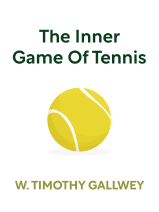

This article is an excerpt from the Shortform book guide to "The Inner Game of Tennis" by W. Timothy Gallwey. Shortform has the world's best summaries and analyses of books you should be reading.
Like this article? Sign up for a free trial here .
Do you want to know how to be competitive? How can sports, like tennis, help you develop a healthy competitive drive?
Learning how to be competitive often starts when you’re young. But it’s important to keep in mind why you want to be competitive, and how it helps you.
Read more about how to be competitive below.
How to Be Competitive (and Why)
Once we find out what game we are playing, we have to figure out what winning means to us. What’s most important is to disentangle winning and losing from our understanding of our self-worth. The worst kind of competition is usually when the participants are using it to derive their self-worth. That is not a good lesson in how to be competitive.
There are two contradicting views on competition in the West: Some believe it is responsible for society’s success, others that it is divisive and responsible for failure.
- Many children are brought up believing the former, and so every point becomes life or death. These children often turn into adults who want to succeed so much that they lose sight of everything else.
- Others rebel, pointing out the cruelty in this sort of society. In young people, this can manifest in a wish to fail. They don’t care that they lost because, according to them, they didn’t try. But even in this case, there’s an understanding that if they did try and lose, that would be a measure of their self-worth.
If we don’t use competition to derive our self-worth, though, what kind of meaning should we be finding in competition and winning? And how can playing better help us in the broader scheme of our mental health?
This question is a difficult one—after managing to decouple competition and his self-worth, Gallwey himself had trouble finding motivation to compete.
To begin to answer this complex question, find the value in challenges and overcoming obstacles. The most accomplished someone can feel is when they have successfully used all of the skill, concentration, and general capability at their disposal.
Winning is only valuable if it helps you achieve a meaningful goal. Find goals that force you to exert yourself, mentally or physically, and then attempt to overcome the obstacles necessary to get there. This means re-evaluating how to be competitive, and why it matter.s
- Consider a surfer’s goals. She is there to find her way all the way to shore in an attractive way, but she doesn’t take every wave that comes her way. She waits for a wave that’s going to be a challenge and fun to ride.
Your opponent can become a friend because she is doing her best to be a difficult obstacle, thus making the goal of winning valuable. Competition, in this way, can be indistinguishable from cooperation. Each player benefits from the other’s attempts to make goals difficult to reach.
Understanding this can also make you a better player: If you have worries or qualms about being competitive or trying your hardest, understand that in a sense, iron sharpens iron. Beating someone does not increase your self-worth or decrease hers.
Exercise: Cooperate With Your Competition
Consider how competition and cooperation can work together in your own life with this exercise on how to be competitive.
Think of a time when a competition didn’t go your way. Were you frustrated? Why?
Now, consider your motivations for playing in that competition. What were they?
Considering your true motivations, how can you reframe the obstacles you faced as collaborators on your journey to conquer meaningful challenges? (For example, maybe your opponent is actually cooperating with you because she makes you work harder and play better.)

———End of Preview———
Like what you just read? Read the rest of the world's best book summary and analysis of W. Timothy Gallwey's "The Inner Game of Tennis" at Shortform .
Here's what you'll find in our full The Inner Game of Tennis summary :
- Why tennis is actually a mind game
- How to quiet the mind and concentrate intently
- Why your self-worth shouldn't be dependent on how you do in competition






